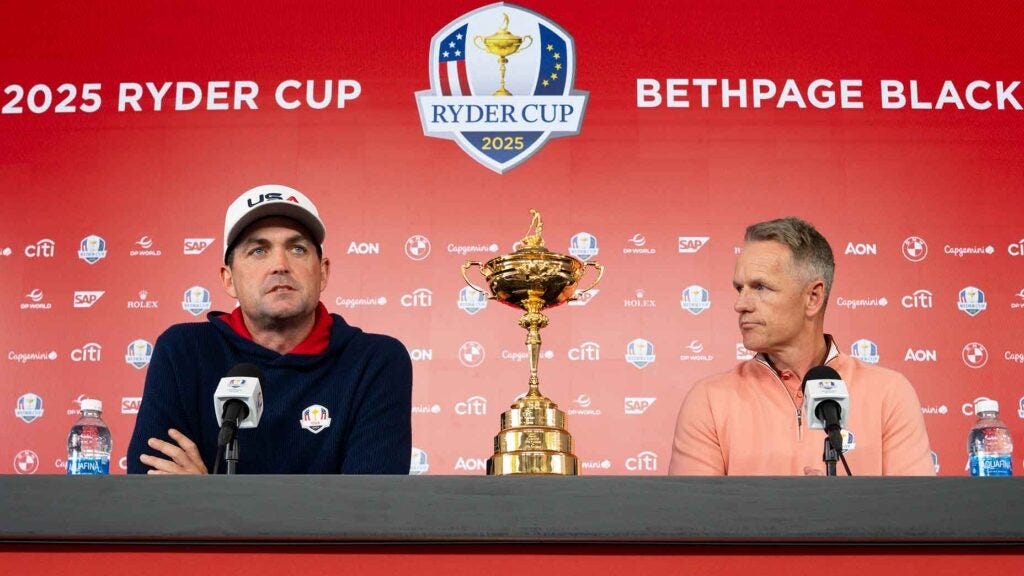Ryder Cup Money: Does $200k for U.S. Players Tarnish The Purity?
Bethpage Black hosts the first Ryder Cup where American players are directly paid, sparking questions about charity, pride, and the meaning of national team golf.
Advertising, Partnerships, or PR Inquiries | Archive
The Ryder Cup was always supposed to be one corner of golf untouched by money, but when the U.S. team steps onto the tee at Bethpage Black, they’ll do so with a $200,000 cheque attached.
The PGA of America confirmed last December that each of the 12 players, along with captain Keegan Bradley, would receive a $200,000 stipend, in addition to a $300,000 allocation for charitable causes. That’s $6.5 million in total, a significant jump from the previous model introduced in 1999 when Tiger Woods and David Duval pushed for charity allocations. Back then, the number was $200,000 per player, held steady for 25 years, until the PGA argued it was time to “bring the Ryder Cup into the present day.”
Critics see something else: the end of the Ryder Cup’s purity. European players, from Rory McIlroy to Luke Donald, have all been asked questions and shared that playing for the flag requires no compensation, while former captain Colin Montgomerie said the move “leaves a sour taste.” Even Patrick Reed, never shy of a commercial deal, called it “unnecessary.” For them, this is a step toward eroding the very foundation of the event and its meaning as a rare space where money is not part of the conversation.
Follow me for more updates on LinkedIn | Instagram | X
The reality, however, is more complex. Most American players have indicated their stipends will go straight to charity. Scottie Scheffler told reporters that he and his wife prefer to give quietly, focusing on Dallas-based organisations without public fanfare. Xander Schauffele said he planned to donate his share, describing it as “something that selfishly will make me feel good about what I do.” Cantlay went further, committing his entire $500,000 package to charities supporting children of military veterans and first responders. Bradley has also chosen discretion, arguing that charitable giving is “a personal decision.”
What emerges is a picture where players may not see this as a personal payday at all, but as a redistribution of Ryder Cup wealth that otherwise sits on the PGA of America’s balance sheet. That balance sheet is hefty: in 2021–22, the organisation reported $192 million in revenue and $73 million in profit, largely driven by its home Ryder Cup, while subsequent years swung back into the red. Chief commercial officer Jeff Price has admitted the competition is “financially critical,” essentially underwriting the PGA’s entire four-year cycle.
Against that backdrop, the new stipend structure looks less like greed and more like a compromise. Golf has already normalised payment in similar contexts; the Presidents Cup offers $250,000 stipends, while the Solheim Cup provides smaller stipends to cover expenses, so the Ryder Cup is in many ways catching up. Still, the optics differ because of what the Ryder Cup represents: passion, tribalism, and a rivalry that stretches beyond economics.
The 2023 event in Rome proved how sensitive the issue is when Patrick Cantlay’s “HatGate” sparked rumours he was protesting the lack of pay, despite his insistence that the hats simply didn’t fit. European fans seized on the idea anyway, waving their caps to taunt him. That episode underlined how quickly compensation talk can bleed into perception, regardless of truth. This year, even with players pledging donations, the fact of a stipend changes the narrative.
For some, it might not matter; for others, they will see this moment as a turning point, the day when one of sport’s few cash-free sanctuaries finally gave way to the economics that dominate everything else.
Perhaps the most interesting question is not whether the U.S. team should be paid, but whether fans will care. One thing we do know, whether they actually care or not, the European fans will likely use it as fuel to write a chant.
The Ryder Cup has entered an era where patriotism and money are no longer mutually exclusive, and what that means for its legacy is still up for debate. I’d love to hear your thoughts about it.
Thanks for reading. If you hit the like button, you’ll be doing me a huge favour.
If you know someone who will enjoy this article, please share it with them.






Golf purity? Seriously? Tarnished? Wow
The answer to your question in a word is yes. Regardless of their motivation for insisting on a personal stipend, playing for country should not be tarnished by money. If the prestige of the event and defending your nation’s honour on the links isn’t adequate motivation, you have no business stepping up to the first tee.